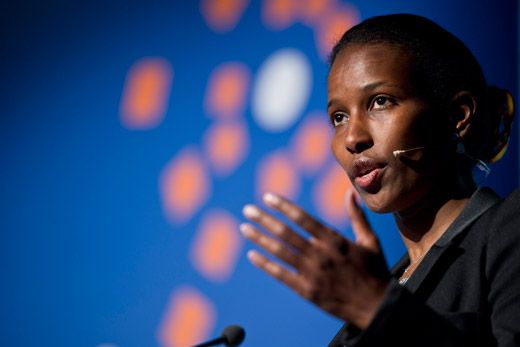Why America is the World’s Shelter
The renowned author of the memoir Infidel found refuge here from persecution abroad
/https://tf-cmsv2-smithsonianmag-media.s3.amazonaws.com/filer/Ayaan-Hirsi-Ali-shelter-631.jpg)
I remember when I was a child in Somalia and my father, who had graduated from Columbia University, would say, “My dream would be to make Somalia like America.” So, the first time I heard about America, it was as a place my father wanted to replicate.
I was born into a Muslim family in Mogadishu. It was a place in turmoil. My father, who was a politician and an opponent of the dictator Siad Barré, was imprisoned. He later escaped and when I was 8 we fled after him to Saudi Arabia. It is a theocracy: There is one state, one religion, that practically imprisons women. All Saudi women are under virtual house arrest; a male companion must accompany them whenever they leave the house. The subjugation of women is pervasive and deep.
Eventually, we moved to Ethiopia, then to Nairobi, Kenya, where we lived from the time I was 10 until I was 22 years old. In that period I learned the English language and read books not only about America, but also the world. We were reading Nancy Drew, Huckleberry Finn. And it wasn’t just that we read American literature—we watched television at a neighbor’s house, programs such as “The Cosby Show.”
I believe that the fact that I remained in school freed me. That experience constituted my first liberation from oppression and poverty and all else.
Ultimately, however, my father, as liberal and enlightened as he was, felt compelled to act according to our cultural heritage. He married me off to a man of his choice, who lived in Canada. Instead of emigrating to Canada, I made my way to Holland in 1992 and requested asylum. My father rejected me; it would be several years before we reconciled.
I studied political science at the University of Leiden. Through a gradual process, I came to shed the Islamic fundamentalist principles I held.
Eventually, in 2003, I was elected to a seat in the Parliament in the Netherlands and I was perceived as an example of someone who had assimilated within ten years. The Netherlands was attempting to assimilate at least two generations of immigrants from Muslim countries. My message was that we must emancipate Muslim women from the tenets of their religion and culture—emancipation being defined as access to education; owning one’s own sexuality; having the opportunity to work and keeping one’s own pay. If we give that opportunity and that freedom to women, I argued, their children will not become dropouts, unemployed, a nuisance to society or, worse, terrorists, because educated women tend to want what’s best for their children.
I began receiving physical threats: “You are no longer a Muslim, you are an apostate, you must be killed.” Finally, in 2004, the Dutch director Theo van Gogh and I created the film Submission focused on violence against Muslim women. Van Gogh was killed by a Dutch-born Islamic fundamentalist on a street in Amsterdam because of it.
Before van Gogh’s death I was placed under intense security. Afterward I was put in a virtual prison to keep me safe. The logical thing was for me to emigrate somewhere else, where I could be free and safe: I found that in America. In 2006 the American Enterprise Institute, a think tank based in Washington, D.C., offered me a job, a community of scholars, an application for a visa. The AEI raised money to pay for private protection, which I still have to this day. In terms of shelter and protection, this country has been so absolutely wonderful to me.
Today, I pursue the work of my foundation, which I established in 2007. Our mission is to protect and defend the rights of women and girls in the West from oppression and violence justified by religion and culture. By religion, I mean, first and foremost, militant Islam.
For me America is a place of refuge and a great nation. I say this without being blind to the problems we have in this country. But the people I have encountered here have given me protection, friendship, love. I feel not only safe, but also absolutely free to lead the life I wanted.
If you look at the number of green card and visa applications every year to the United States, then I think that the idea that you can arrive in this country and take a chance at building a life for yourself is very much alive. It is still a land of opportunity— the world’s shelter.
Planning Your Next Trip?
Explore great travel deals
Smithsonian magazine participates in affiliate link advertising programs. If you purchase an item through these links, we receive a commission.
